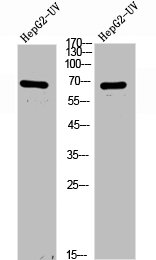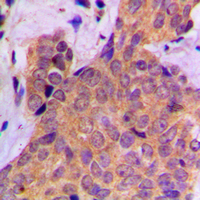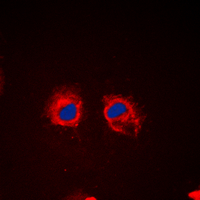![ELISA analysis of antigen using GTX60419 Cortactin antibody [4C6]. Red : Control antigen 100ng Purple : Antigen 10ng Green : Antigen 50ng Blue : Antigen 100ng ELISA analysis of antigen using GTX60419 Cortactin antibody [4C6]. Red : Control antigen 100ng Purple : Antigen 10ng Green : Antigen 50ng Blue : Antigen 100ng](https://www.genetex.com/upload/website/prouct_img/normal/GTX60419/GTX60419_20170912_ELISA_w_23061123_178.webp)
ELISA analysis of antigen using GTX60419 Cortactin antibody [4C6]. Red : Control antigen 100ng Purple : Antigen 10ng Green : Antigen 50ng Blue : Antigen 100ng
Cortactin antibody [4C6]
GTX60419
ApplicationsWestern Blot, ELISA, ImmunoHistoChemistry, ImmunoHistoChemistry Paraffin
Product group Antibodies
TargetCTTN
Overview
- SupplierGeneTex
- Product NameCortactin antibody [4C6]
- Delivery Days Customer9
- Application Supplier NoteWB: 1/500 - 1/2000. IHC-P: 1/200 - 1/1000. ELISA: 1/10000. *Optimal dilutions/concentrations should be determined by the researcher.Not tested in other applications.
- ApplicationsWestern Blot, ELISA, ImmunoHistoChemistry, ImmunoHistoChemistry Paraffin
- CertificationResearch Use Only
- ClonalityMonoclonal
- Clone ID4C6
- ConjugateUnconjugated
- Gene ID2017
- Target nameCTTN
- Target descriptioncortactin
- Target synonymsEMS1, src substrate cortactin, amplaxin, ems1 sequence (mammary tumor and squamous cell carcinoma-associated (p80/85 src substrate), epididymis secretory sperm binding protein, oncogene EMS1
- HostMouse
- IsotypeIgG1
- Protein IDQ14247
- Protein NameSrc substrate cortactin
- Scientific DescriptionThis gene is overexpressed in breast cancer and squamous cell carcinomas of the head and neck. The encoded protein is localized in the cytoplasm and in areas of the cell-substratum contacts. This gene has two roles: (1) regulating the interactions between components of adherens-type junctions and (2) organizing the cytoskeleton and cell adhesion structures of epithelia and carcinoma cells. During apoptosis, the encoded protein is degraded in a caspase-dependent manner. The aberrant regulation of this gene contributes to tumor cell invasion and metastasis. Three splice variants that encode different isoforms have been identified for this gene. [provided by RefSeq, May 2010]
- Storage Instruction-20°C or -80°C,2°C to 8°C
- UNSPSC12352203

![IHC-P analysis of cervical cancer tissue (left) and tonsil tissue (right) using GTX60419 Cortactin antibody [4C6]. IHC-P analysis of cervical cancer tissue (left) and tonsil tissue (right) using GTX60419 Cortactin antibody [4C6].](https://www.genetex.com/upload/website/prouct_img/normal/GTX60419/GTX60419_20170912_IHC-P_w_23061123_870.webp)
![WB analysis of HeLa (1), A431 (2), MCF-7 (3), SR-BR-3 (4), HepG2 (5) and NIH3T3 (6) cell lysate using GTX60419 Cortactin antibody [4C6]. WB analysis of HeLa (1), A431 (2), MCF-7 (3), SR-BR-3 (4), HepG2 (5) and NIH3T3 (6) cell lysate using GTX60419 Cortactin antibody [4C6].](https://www.genetex.com/upload/website/prouct_img/normal/GTX60419/GTX60419_20170912_WB_w_23061123_365.webp)





